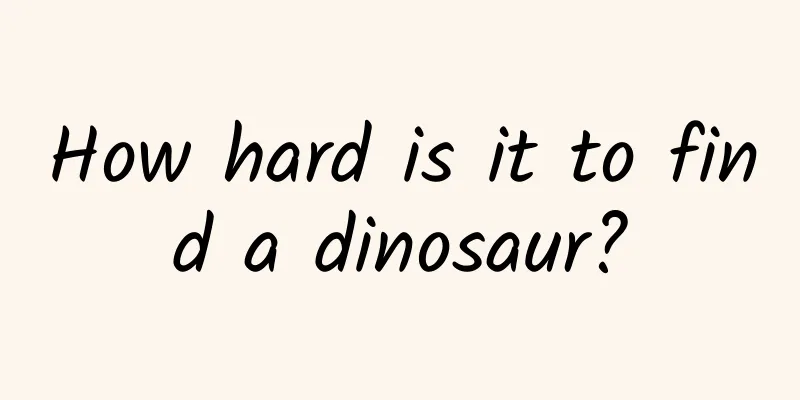How hard is it to find a dinosaur?

|
Right now You are looking at this dinosaur No doubt lucky Need to know This meeting spanned 66 million years (Dinosaur fossil skeletons on display in Lufeng Dinosaur Valley. The dinosaurs mentioned below are only non-avian dinosaurs in the order Dinosauria. From the perspective of modern phylogenetics, birds are a special type of dinosaur. Pterosaurs, plesiosaurs, and mosasaurs, which are often mistaken for dinosaurs, are not included in this category. Image source: Visual China) ▼ 66 million years The mainland splits and reunites Species are born and die This ancient life But it spanned such a long time Meet us This also allows us Through their remaining traces Recreate an extremely magnificent prehistoric era We can even infer that The experience of the last non-avian dinosaur Although this may be a Sad story they What exactly happened? (Partial fossil skeleton of Lufengosaurus, photographer @贾翔) ▼ 01 The last dinosaur About 66 million years ago The last dinosaur in the world is walking alone There is no one like it around Even it can't remember The last time another dinosaur was seen How long ago was it? (In the late Cretaceous period, various disasters struck, and only the last dinosaur was left in the world. Map by @肖桐&张琪/Planetary Research Institute) ▼ It just feels that the climate is getting hotter The air I breathe becomes more and more pungent Sometimes it rains suddenly Did not bring the long-lost coolness Corrosive acid rain Instead, it will make its thick skin hurt. Harsh environment Finally brought it to death It won't know Their era Which dinosaur opened the first I can't think of my own death. It actually means the end of the dinosaur era (Please watch in horizontal mode. From the late Triassic period [about 230 million years ago] to the late Cretaceous period [about 66 million years ago], countless dinosaurs of different shapes and sizes were born on Earth. The following text will unlock the information of each dinosaur in the picture below at different locations. Map by @Hanqing/Planetary Research Institute) ▼ But death can't give it rest The "enemies" on land who were eyeing its corpse I can't hold back As per usual Animals will eat its flesh Microorganisms will cause it to rot The wind and sand will scatter and polish its bones As the overlord of the earth, it would never think Things that it had never looked at in its lifetime It would become so miserable after death. anyway Its body is already difficult to preserve. (After the last dinosaur died, its body was damaged in many ways and was in tatters. Map by @肖桐&张琪/Planetary Research Institute) ▼ Eventually it will be completely decomposed Becomes carbon dioxide, water and inorganic substances Return to nature without leaving any trace like this This is the final destination of almost all dinosaurs. But sometimes accidents happen As long as its remains can be buried quickly It's possible to escape this disaster (Etna volcano erupts in Sicily, Italy. Along with the lava, volcanic ash also erupts from the surface. There was once a case where dinosaurs were quickly buried in volcanic ash after they died. Image source: Visual China) ▼ Sometimes it's lucky enough Buried where he died But more often it needs the help of a force Move it underwater and bury it (After the dinosaurs sank underwater, mud and sand fell and accumulated, burying them. Map by @肖桐&张琪/Planetary Research Institute) ▼ Although this process It's still a thrilling adventure Violent impact, turbulent water Microbial decomposition and silt flushing It's enough to make its body dismembered Even exhausted Too many uncertainties No need to collect all Even if you meet one of them We will not be able to successfully " summon the dragon " But if every time It can just brush past those unfavorable conditions Then it will enter the next stage Fossilized (Millennium Sinornithosaurus fossil. Millennium Sinornithosaurus is a dinosaur with primitive feathers. Although it is small in size, it is a "poison master" with deadly weapons. It can inject venom into the prey through its fangs to paralyze the target. Photographer @柳叶氘, map @肖桐/Planetary Research Institute) ▼ At this stage Some minerals will wait Growing in its hollow, porous frame Fill the holes in his bones Make it tight and strong This subtle change It will last for millions of years Until most of the matter that originally belonged to this life form All replaced by minerals It also combines with the surrounding sediment and debris Until it solidifies into rock (Giant Lufengosaurus fossil, discovered in Lufeng, Yunnan, photographer @贾翔, map @肖桐/Planetary Research Institute) ▼ today When these former overlords of the Earth appear again It is no longer the high-spirited appearance of the past Their body parts Most of them have become scattered fossils. Blends in with the real rocks around Difficult to distinguish (Dinosaur fossils embedded in the surrounding rocks, photographer @张艳, map @汉青/星球研究院) ▼ Once in Lufeng, Yunnan A farmer found such a stone The dimples on top made him feel good. So I took it home and used it to hold kerosene. Made a kerosene lamp Until I met a paleontologist Yang Zhongjian and Bian Meinian (The background is the video material displayed in the Lufeng Dinosaur Site Museum in China. The person on the right is Academician Yang Zhongjian; the fossil skeleton is Lufengosaurus xusii. Photographers @贾翔&罗捷, map @汉青/星球研究院) ▼ In their excavation The Lufeng Fauna that Amazes the World Recovering from the light of day This includes The "First Dragon of China" Found in the War Lufengosaurus xu ( Please watch in horizontal mode . The first fossil skeleton of Lufengosaurus xu'sii. It is exhibited in the Chinese Paleozoological Museum as a treasure of the museum. The skeleton was discovered in Lufeng, Yunnan in 1938 by Mr. Yang Zhongjian and others. In order to commemorate the German paleontologist Schnabel who provided him with a lot of help, Mr. Yang Zhongjian named it "Lufengosaurus xu'sii". This is the first dinosaur discovered, studied, mounted and named by the Chinese themselves. It is also the first dinosaur in the world to be on a stamp. Photographer @柳叶氘) ▼ But unfortunately More dinosaurs Even though I have gone through so many difficulties and become a fossil No chance to meet us 02 Finding Dinosaurs In the process of a dinosaur becoming a fossil Rivers, lakes and seas on Earth Sediment and debris continue to accumulate And millions of years later Solidify again into new rock According to this trend Dinosaurs will be "sealed" layer by layer Never see the light of day again Unless a great force comes Pushing the rock layer containing dinosaur fossils back to the surface And the time when this power arrives Equally important (After the earth's crust was lifted, the rock layer covering the dinosaur fossils was weathered, allowing the dinosaur fossils to see the light of day again. Map by @张琪/Planetary Research Institute) ▼ If this power comes too late These fossils It is likely to encounter high temperature and high pressure underground Thus heading towards "death" again If it's too early Before humans encountered them Rain, snow, wind and frost in nature It may disintegrate the layers of rock that surround it. Dinosaur fossils exposed to the elements are very fragile Even the slightest natural force could destroy it. (Wind erosion mushrooms, the hard rocks are worn into mushroom-like shapes under the long-term wind force, photographer @曾建军) ▼ Not long ago There are paleontologists in Lufeng, Yunnan A new dinosaur fossil site was found Years of wind and rain The precious skull fossils of dinosaurs have been taken away The roots of the plants are also all over its body (Dinosaur fossils discovered by Chinese paleontologists in Lufeng, Yunnan in the winter of 2022, photographer @尤海鲁) ▼ But even if this force comes just right On Earth's 149 million square kilometers of land There are various rocks scattered around Want to find a dinosaur fossil somewhere in there It's like finding a needle in a haystack. Fortunately, the human species seems to be quite intelligent. They have only been exploring for a century or two. It seems that he has figured out the trick to finding dinosaurs. They know Igneous rocks that are formed from magma (Rhyolitic volcanic columnar joints in Hong Kong Global Geopark. Magmatic rocks are a type of rock formed by the cooling of magma at a temperature of hundreds or even thousands of degrees. Magmatic rocks, metamorphic rocks and sedimentary rocks together constitute the three major types of rocks on Earth. Photographer @李宇鹏) ▼ as well as Metamorphic rocks formed under extreme conditions It is impossible to find any trace of dinosaurs (Rocks mixed with metamorphic rocks on the lakeside of Asturias, Spain, picture source @Visual China) ▼ Only in those Sedimentary rocks formed by finely divided particles It is possible that the bodies of dinosaurs are buried (Zhangye Colorful Hills, formed by the stacking of various colored sedimentary rocks, photographer @赵高翔) ▼ They know These sedimentary rocks also have their own ages In the rocks that are too old It will only hide creatures older than dinosaurs. Rocks that are too young have not yet formed, and dinosaurs have long been extinct (Trilobite fossils. Trilobites lived in the ocean 570 million to 240 million years ago, while the earliest dinosaurs appeared on land about 230 million years ago. Image source: Visual China) ▼ They also know Sedimentary rocks formed in the ocean There are few land creatures like dinosaurs. And those sedimentary rocks formed on land More likely to find clues about dinosaurs (Sea lily fossil. Sea lily lives in the ocean, but it is not a plant, but an echinoderm. Photographer @柳叶氘, map @肖桐/Planetary Research Institute) ▼ To find them Humans have also suffered Because these rock layers may contain dinosaur fossils Randomly distributed in different places Sometimes there is no transportation to reach (Dinosaur footprint fossils appeared on a high rock wall. Researchers could only climb up the rock with the help of ropes and ladders to conduct research. Photographer: @王董浩) ▼ But humans who are full of curiosity Seems to be obsessed with these former overlords of the earth They would rather take risks I have to go to those places again and again Hard-to-reach destinations Just to find every dinosaur fossil that has survived to this day (Dinosaur fossil excavation site on a steep slope, photographer @周正) ▼ But not every expedition can be victorious. Sometimes we need a little bit of luck For example, as early as 1956 People discovered the first dinosaur fossil in Shanxi, China. In the nearly half a century that followed Humanity's desperate search has all come to nothing. Until 2011 and after The rich variety and number of dinosaurs in Shanxi Only then appeared before the world ( Please watch in horizontal screen , dinosaur fossil skeletons on display in Shanxi Geological Museum, image source @Visual China, map @Xiao Tong/Planet Research Institute) ▼ But it is also because It is so difficult to find dinosaur fossils that have survived to this day. Every harvest is more precious. Whenever humans discover a suspicious target Use a variety of tools Carefully remove the covering on the dinosaur Excess rocks and dirt (Some equipment collection of Summon the Dragon [Discover Dinosaurs], photographer @Yu Shuhan) ▼ Re-glue their cracked bones Then fix them with plaster or large wooden boxes. Bringing it back to the human lab There Humans will wash away the mud for dinosaurs ( Please watch in horizontal mode . Researchers are cleaning dinosaur fossils in the Lufeng Dinosaur Fossil Museum. Photographer: Zhou Mingjia) ▼ Scattered, confused bones Put it back together in the right way And prepare them carefully Their own names (Yang's Tianzhensaurus exhibited in the Shanxi Geological Museum, image source @Visual China, map @Xiao Tong/Planet Research Institute) ▼ Not only that Humans are also trying to understand them better. And the world they live in For example, from the fossilized food residues in their teeth or in fossilized feces Find out whether they are meat eaters or vegetarians (Dinosaur feces fossils hidden in the Chengdu Natural History Museum, photographer @张艳, map @汉青/星球研究院) ▼ Judging their movement posture from their skeletal features In the rocks that encase them Detecting something called "isotopes" Feel the temperature and oxygen availability during the dinosaurs' life etc. Here, dinosaurs no longer wander No need to worry about accidents happening at any time. Because humans treasure them. ( Please watch in horizontal mode . People gather to see the huge Mamenchisaurus skeleton in Zigong Museum. Photographer: Zhou Ying) ▼ Today After nearly a century of pursuit by Chinese paleontologists, More than 300 species of dinosaurs have been discovered in my country This also makes China the country with the most dinosaur discoveries in the world. No one (Distribution map of some dinosaur-related fossils [including some dinosaur bone fossils, footprint fossils and dinosaur egg fossils]. The Triassic, Jurassic and Cretaceous periods can be subdivided from early to late into the Early, Middle and Late Triassic, Early, Middle and Late Jurassic, and Early and Late Cretaceous. Map by @张松楠&汉青/星球研究院) ▼ Some broken dinosaur bone fossils (Dinosaur bone fossils in Lufeng Dinosaur Fossil Museum, photographer @周明佳) ▼ Fossilized footprints that remain unchanged after stepping into the mud (Zigong Shileisaurus footprint fossil, the footprint was formed 180 million years ago, photographer @公强) ▼ Dinosaur egg fossils that were buried before they could hatch They are like pieces of a puzzle (Dinosaur egg fossils hidden in Nanjing Paleontological Museum, photographer @Lu Hu) ▼ With the help of them We were able to piece together a The Wonderful Chinese Dinosaur Kingdom 03 Chinese Dinosaur Kingdom This is an incredibly magnificent prehistoric world. In today's China There were dinosaurs of all shapes and sizes emerging one after another. As early as about 200 million years ago That was the beginning of the Jurassic period. Some ancient dinosaurs "landed" in Yunnan Yunnan at that time was not like today, with four seasons of spring. The climate is closer to the modern African savannah (Masai Mara Wildlife Reserve, Kenya. In the early Jurassic period, the climate of today's Yunnan was similar to that of the current African savannah. It should be noted that there are certain differences between the modern geographical pattern and the ancient geographical pattern, but for ease of understanding, modern place names will be used in the following text. Image source: @Visual China) ▼ A kind of dinosaur lived here Long neck and small head And a mouthful of "spear-shaped" teeth Whether in terms of appearance or figure They are not wild hunters stalking their prey. They are more like a group of gentle "vegetarian dragons" Humans 200 million years from now According to the location where their fossils were found They are called Lufengosaurus (Reconstruction diagram of Lufengosaurus xuii, drawn by @Hanqing & Xiaotong/Planetary Research Institute) ▼ At the same time Sichuan Basin not far from Yunnan Most of it is still submerged in the lake water. But halfway through the Jurassic There will be a sudden change like the sea changes. Great ancient lake Transformed into small lakes scattered all over the place Rivers flow between lakes and land The environment is warmer and the vegetation is more lush (The Three Gorges of the Yangtze River. Due to the uplift of the earth's crust, the lake environment in Sichuan no longer exists, and the Sichuan Basin has changed from an inland basin to an outward basin. Photographer @李心宽) ▼ The superior habitat provided an excellent habitat for dinosaurs. The number and species of herbivorous dinosaurs increased dramatically Carnivorous dinosaurs were not far behind (Schematic diagram of the restoration of the Qilong, drawn by @Hanqing & Xiaotong/Planetary Research Institute) ▼ Facing the fierce attack of carnivorous dinosaurs Herbivorous dinosaurs would never sit still and wait for death Some of them have a tail club like an iron ball growing on their tail. For example, the earliest group of Shusaurus li (Reconstruction diagram of Shusaurus li, drawn by @Hanqing & Xiaotong/Planetary Research Institute) ▼ Some have sharp bone spurs on their backs that are like swords. For example, the "Swordsman" in Dinosaur Huayangosaurus taibaiensis These dinosaurs have their own "weapons" Enough to fight back when in danger (Reconstruction diagram of Taibai Huayanglong, drawn by @Hanqing & Xiaotong/Planetary Research Institute) ▼ This is a herbivorous dinosaur and a carnivorous dinosaur The era of keeping pace The glory of dinosaurs has begun to take shape It seems that the environment is too comfortable In the late Jurassic Some herbivorous dinosaurs The neck is getting longer and the body is getting bigger Mamenchisaurus is one of the most typical representatives. ( Please watch horizontally , the restoration of Mamenchisaurus youngi is shown in the figure, drawn by @Hanqing & Xiaotong/Planetary Research Institute) ▼ The carnivorous dinosaurs And getting stronger and more ferocious For example, the hot-tempered Yongchuan dragon (Reconstruction diagram of the upper reaches of Yongchuansaurus, drawn by @Hanqing & Xiaotong/Planetary Research Institute) ▼ More types of dinosaurs Appearing on a wider land Became the undisputed overlord of the earth at that time Then, the end of the Jurassic The Cretaceous Period arrived Today's northern Hebei and western Liaoning regions It became a perfect place for dinosaurs to settle down. There Coniferous forest, pine, cypress, fern There are even shrubs and herbs Together they form a primitive and lush forest (The alpine coniferous forest in Geza Township, Shangri-La. In the era of dinosaurs, there were many coniferous forests on the earth. Photographer: @仇梦涵) ▼ At this time, a strange dinosaur Becoming the new face of the new era They have a parrot-like beak. Therefore, it is called " Psittacosaurus ". For this dinosaur A body length of two meters is rare It looks particularly cute among the huge dinosaurs. (Reconstruction of the Chinese Psittacosaurus, courtesy of @Hanqing & Xiaotong/Planetary Research Institute) ▼ They are also more partial to food Particularly fond of roots and nuts This type of food is difficult to chew But they are smart Swallow the gravel to aid digestion In this era of warm climate, Occasionally there will be a cold episode Especially in today's Liaoning region Some dinosaurs chose to wear fur to survive the cold This even includes the powerful carnivorous dinosaurs Yutyrannus (Reconstruction diagram of Yutyrannus, drawn by @Hanqing & Xiaotong/Planetary Research Institute) ▼ Even though they are covered in feathers But still can't fly Only some of the more agile members Mastered the art of gliding (Reconstruction of Anchiornis hercules, drawn by @Hanqing & Xiaotong/Planetary Research Institute) ▼ But some of them Evolved into true birds Hit the Sky (Modern birds flying freely, photographer @刘辰) ▼ The "Longding Xingwang" family There seems to be a bright future No one expected the disaster to come so quietly. Volcanoes, high temperatures, drying up of rivers and lakes, asteroid impacts Competing for the stage Stable life As if it vanished in an instant (Map of the Chicxulub crater in Mexico. The asteroid impact, large-scale volcanic eruptions, environmental degradation and other factors may be the culprit for the extinction of dinosaurs. Map by @Zheng Yi/Planetary Research Institute) ▼ Like countless disasters in the past The story of survival of the fittest repeats itself But the difference is that this time the dinosaurs are at a disadvantage. They are doomed to fail. A unique dinosaur that lived at this time Has a duck-like mouth Therefore, humans call it "duck-billed dinosaur". They have thousands of teeth in their mouths. Chewing food vigorously and flexibly When the rainy season comes Groups of duck-billed dinosaurs would also migrate along the water system. The harsh environment forces them to leave On a devastated planet Searching for the few remaining habitats (Reconstruction diagram of Qingdaosaurus spinorhinus, drawn by @Hanqing & Xiaotong/Planetary Research Institute) ▼ However, no matter how powerful the overlord is It can't last forever In the face of natural changes that are beyond our control The dinosaurs died Until the last dinosaur dies The glorious age of dinosaurs came to an end now As humans continue to discover new dinosaurs Constructing an increasingly fascinating prehistoric world This topic about dinosaurs It's even more sad Because its ending is sad anyway. (In Lufeng Dinosaur Valley, there are many dinosaur fossil skeletons on display at the Dinosaur Site Museum. Photographer: @贾翔) ▼ It is conceivable If dinosaur remains I have never experienced any hardships and survived. Humans have never traveled thousands of miles to find them. Then we will eventually miss the glory of a generation of overlords (Chinese dragon skeleton, photographer @Lu Jianshu) ▼ but Since humans first encountered dinosaur fossils This means that dinosaurs will always belong to the ancient times. In the future, no matter how long it will be We can't witness it again. The rise of this great species (In the Dinosaur Site Museum in Lufeng Dinosaur Valley, people gather around dinosaur fossils scattered in the rock walls. Photographer: @贾翔) ▼ But this is the planet A story that is always happening In the 4.6 billion years since the Earth was born Countless species appeared Countless species have become extinct They use traces of their existence Solving countless mysteries about life That’s why The planet we live on together It became the vast and boundless universe A great miracle This article was created by Written by : Xiaoxi Editor : Mr. Zhen Image : Daytime sleep Design : Han Qing & Xiao Tong & Zhang Qi Map : Zhang Songnan Reviewer : Yunwukongcheng Cover Photographer : He Yi Audit Expert You Hailu, researcher at the Institute of Vertebrate Paleontology and Paleoanthropology, Chinese Academy of Sciences 【References】You can scroll up and down to view [1] Tong Jinnan, Yin Hongfu. Paleontology[M]. Higher Education Press, 2007. [2] Lu Liangzhao, Xu Wenliang. Petrology[M]. Geological Press, 2011. [3] Guo Yunlin, Huang Daxi. Zigong Dinosaur Fossils[M]. Sichuan Science and Technology Press, 1993. [4] Peng Guangzhao, Ye Yong, Gao Yuhui et al. Jurassic dinosaur fauna in Zigong area [M]. Sichuan People's Publishing House, 2005. [5] Shen Huan. Jurassic global climate paleogeographic evolution and its constraints on the distribution of dinosaur fossils[D]. China University of Geosciences (Beijing), 2021. [6] Deng Shenghui, Lu Yuanzheng, Zhao Yi. Regional evolution of China's Jurassic paleoclimate[J]. Earth Science Frontiers, 2017. [7] Cao Ke. Sedimentary characteristics and paleogeographic features of the continental Cretaceous in China[D]. China University of Geosciences (Beijing), 2010. [8] Dong Zhiming. Dinosaur Faunas of China[M]. Berlin: China Ocean Press (Beijing), 1992. [9] Wang Xiaolin. History and current status of dinosaur research in China[J]. World Geology, 1998. [10] Yang Zhongjian. Reconstruction of Xu's Lufeng Longzhi[J]. Geological Review, 1940. [11] Zhen Shuonan. On the diet of Lufengosaurus xuii[J]. Biological Bulletin, 1960. [12] Zheng Qianyu. Early Cretaceous Dabeigou Formation palynoflora and paleoclimate significance in northern Hebei Province[D]. China University of Geosciences (Beijing), 2021. [13] Zhang Lijun. The main geological background of the evolution of the Jehol Biota in western Liaoning[J]. World Geology, 2013. [14] CUI Ying, GONG Enpu, WANG Tiehui. Age and paleoclimate records of the sporopollen assemblage of the Zhuanchengzi Layer of the Yixian Formation in western Liaoning Province[J]. Science China: Earth Sciences, 2015. [15] Kuang Hongwei, Liu Yongqing, Dong Chao, et al. Taphonomic study of Late Cretaceous dinosaur fossils in Zhucheng, Shandong Province[J]. Acta Geologica Sinica, 2014. [16] Dong Zhiming. Dinosaur fauna and its stratigraphy in China[J]. Journal of Stratigraphy, 1980. [17] Wan Xiaoqiao, Wu Huaichun, Xi Dangpeng, et al. Terrestrial biota and climate environment evolution during the Cretaceous greenhouse period in Northeast China[J]. Earth Science Frontiers, 2017. |
>>: Sold out in seconds! Sold out! What to do if you can’t get a ticket? Here’s a guide
Recommend
"Red Coast Base" is more than just science fiction: We are looking for alien civilizations in the radio waves
The "real and imaginary" Red Coast Base...
Channel Operation丨If you want to be a promotion expert, you need to combine surprising tactics
There is a saying that "channels are king&qu...
How can business services achieve positive growth in search promotion effects? Optimization ideas reference
1. Background Main business: Business service ind...
It is said that ozone is harmful to health, so why do we still need to protect the ozone layer?
September 16 is the International Day for the Pro...
Netizens share tips on iPhone power saving: Extend battery life through system settings
For iPhone users, the battery life of the device ...
Tik Tok short video marketing tips!
Douyin is a platform mainly based on short videos...
The most powerful car has orders running faster than others! The new MG6 received more than 2,000 orders in the first weekend after its launch
66666! The new MG6, which can reach 100 km/h in 6...
A complete list of Android app markets and app package names!
During the development process, you may encounter...
My bones are always making crackling sounds. Do I need treatment?
Audit expert: Wang Linyu Deputy Chief Physician, ...
Why are 16-megapixel mobile phone photos not as good as iPhone?
The image quality of digital cameras is a commonp...
Don’t worry! Big companies won’t “steal” your entrepreneurial idea
[[161042]] A common question startups ask is, “Wh...
Is running 800 meters a nightmare? Learn this trick to run easily
Recently, many universities have conducted physic...
Light, a strange world
Loading long image... Source: National Geographic...
Don’t know how to plan advertising? Here is a complete set of templates!
Information flow advertising is now the new favor...
Thunderbird Air 1S smart XR glasses review: a cheap alternative to Apple Vision Pro
With the release of Apple Vision Pro, the concept...









